Introduction: The Enneagram, a Powerful Tool for Fulfilling Love Relationships
Romantic relationships often mirror our inner worlds. Our fears, desires, habits, and how we perceive others directly impact the quality of our relationships. The Enneagram, a centuries-old personality typology system, offers a unique perspective on understanding these dynamics. By identifying your Enneagram type and that of your partner, you can not only better understand yourself but also transform your romantic relationships by strengthening connection, communication, and compassion.
In this article, we will explore how the Enneagram can profoundly impact your love life. We’ll discuss how this tool can help you understand your partner’s deep motivations, anticipate conflicts, and create a more harmonious and fulfilling relationship.
What Is the Enneagram and How Can It Affect Romantic Relationships?
Understanding the Enneagram
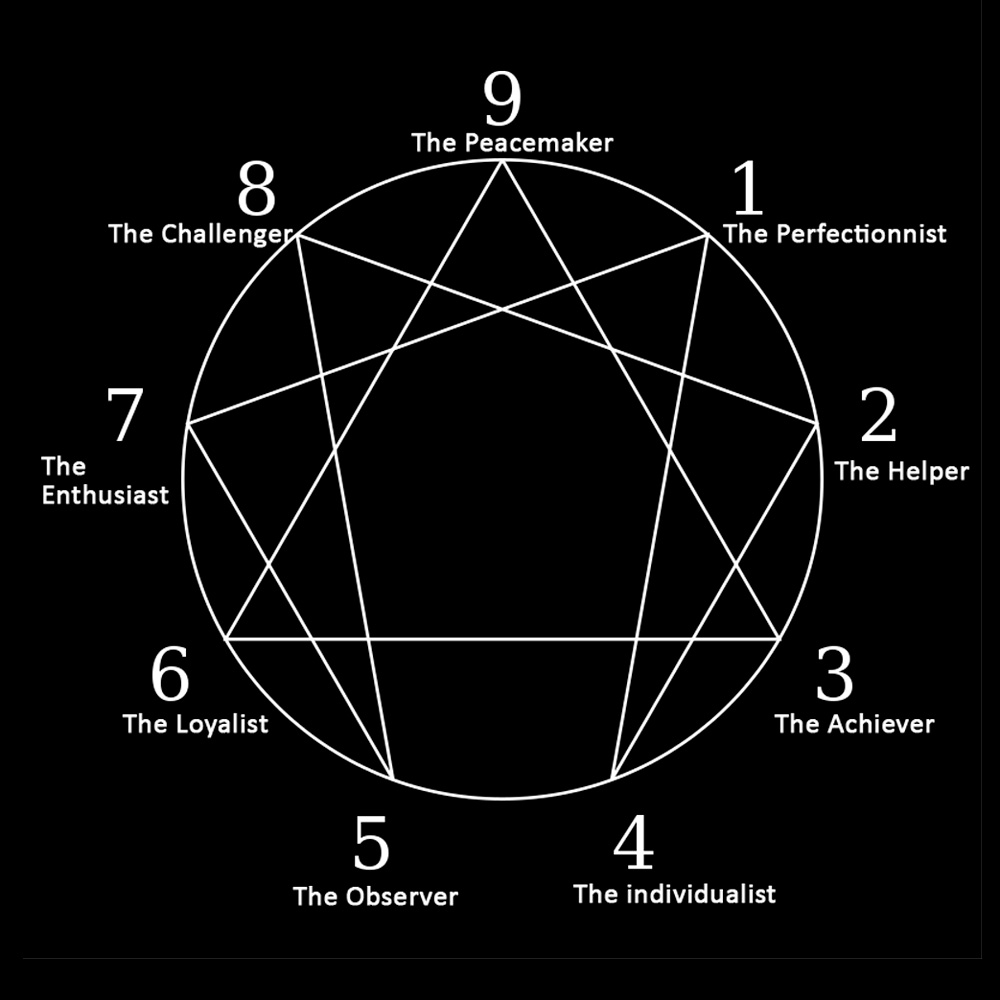
The Enneagram divides human personalities into nine distinct types, each with its own motivations, fears, and ways of perceiving the world. These types are not rigid; they exist on a continuum and can be influenced by various factors like "wings" (neighboring types) and "subtypes" (dominant instincts).
Why Is the Enneagram Important in Romantic Relationships?

Romantic relationships are often complex because they involve the interaction between two unique inner worlds. The Enneagram helps illuminate these interactions by providing a common language to discuss deep motivations and behaviors.
Example: If you are a Type 2 (The Helper) and your partner is a Type 5 (The Investigator), you might feel frustrated by their need for solitude while you naturally lean towards offering affection. Understanding that your partner values independence and that this is not a personal rejection can greatly improve communication and reduce misunderstandings.
The Nine Enneagram Personality Types and Their Dynamics in Love
Now, let’s explore how each Enneagram type behaves in a romantic relationship and how this knowledge can transform the way you interact with your partner.
Type 1: The Perfectionist in Love
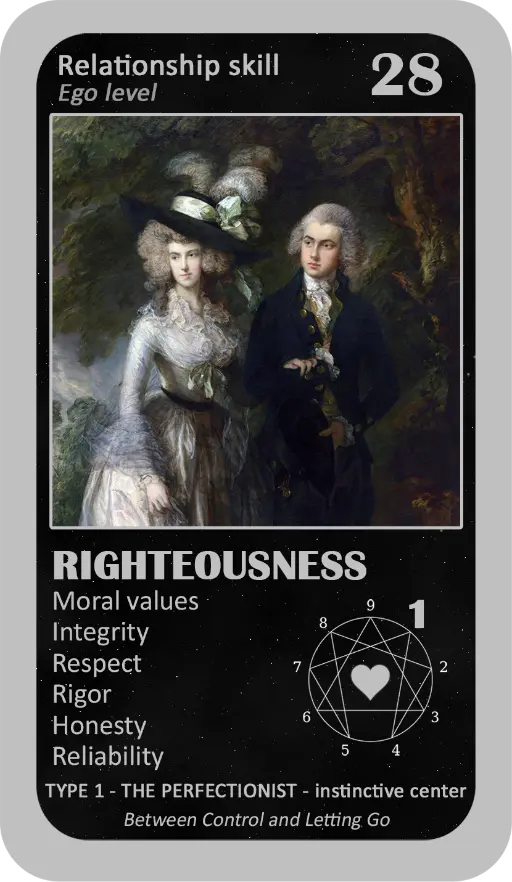
Characteristics: Perfectionists are ethical, conscientious, and have a strong sense of justice. They strive to do what is right and to improve their environment, which can include their romantic relationship.
In Love: Perfectionists may have high expectations, both for themselves and their partner. They seek to create a "perfect" relationship and can be critical when things don’t go as planned.
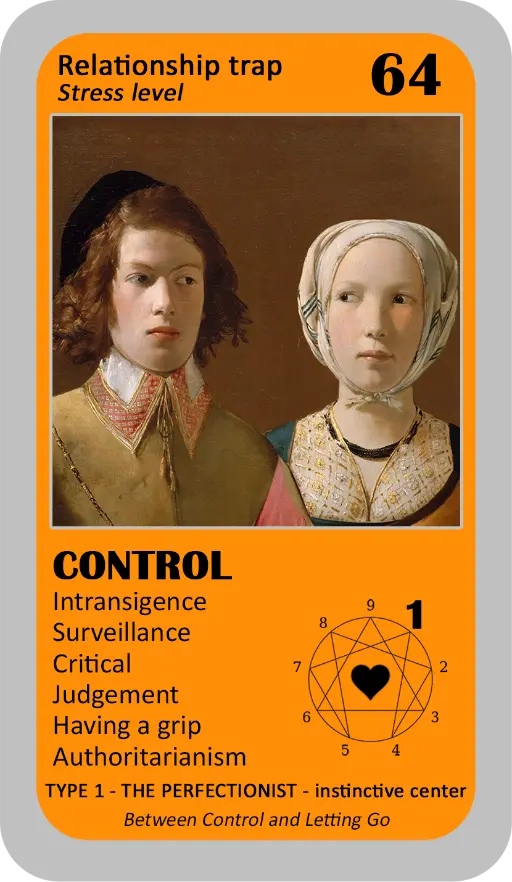
Challenges: Their tendency to be critical and controlling can be perceived as coldness or permanent dissatisfaction. They must learn to let go of their need for perfection and accept that relationships are inherently imperfect.
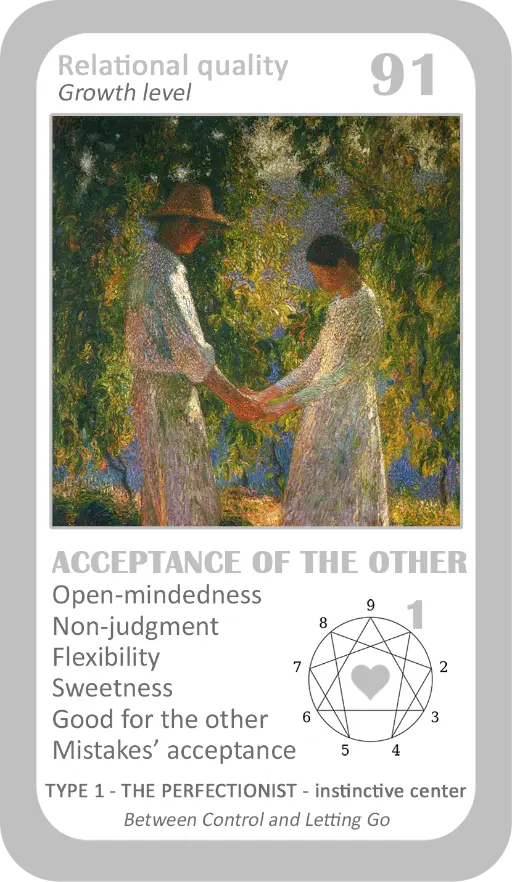
Tip: If you are in a relationship with a Perfectionist, it’s essential to understand that their criticism stems from a deep desire for improvement, not a lack of love. Encouraging open communication about their expectations can help create a space of mutual tolerance and acceptance.
Type 2: The Helper in Love
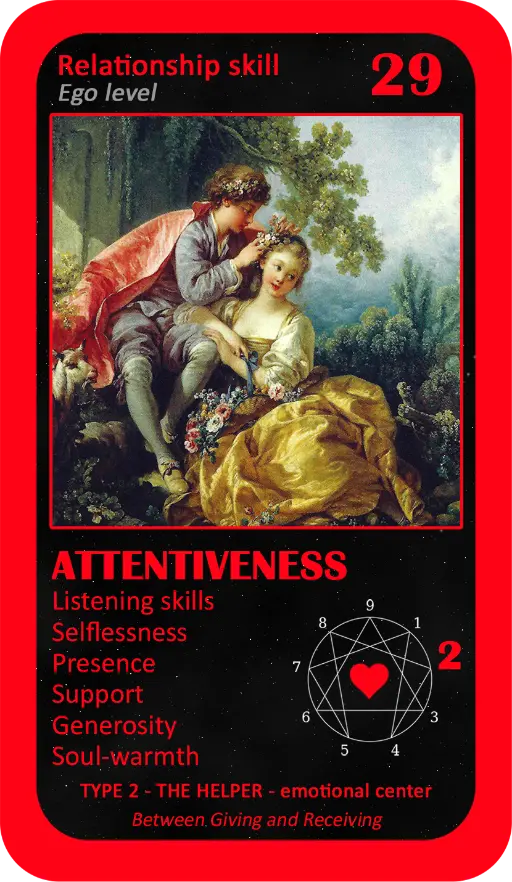
Characteristics: Helpers are caring, empathetic, generous, and relationship-oriented. They have an intrinsic need to feel useful and to nurture others, making them devoted and attentive partners.
In Love: Helpers invest heavily in their relationship, sometimes to the point of neglecting their own needs. They constantly seek to please their partner and are highly sensitive to the needs and emotions of others.
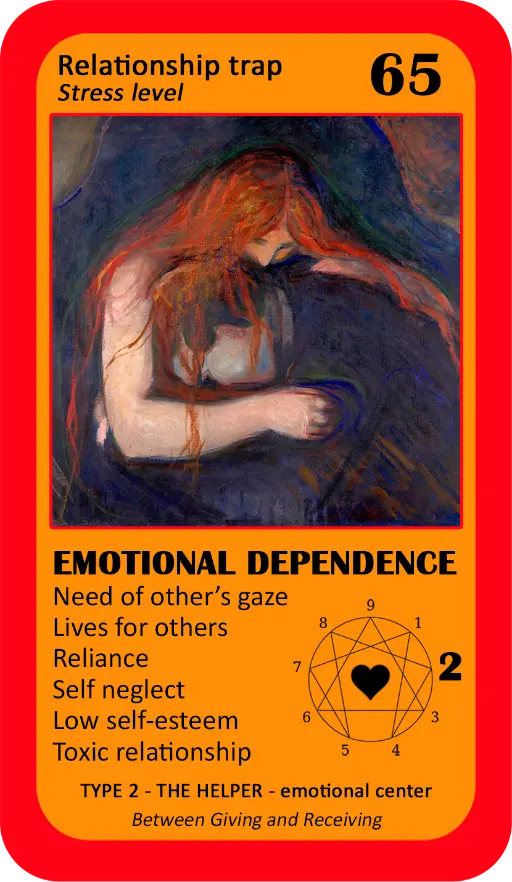
Challenges: This tendency to altruism can sometimes lead to imbalance, where the Helper feels exploited or undervalued. They may also develop emotional dependency, linking their self-worth to satisfying their partner’s needs.

Tip: If you are in a relationship with a Helper, it’s crucial to recognize and appreciate their efforts while encouraging them to take care of themselves and develop more autonomy. Ensure they know you love them for who they are, not just for what they do for you.
Type 3: The Achiever in Love
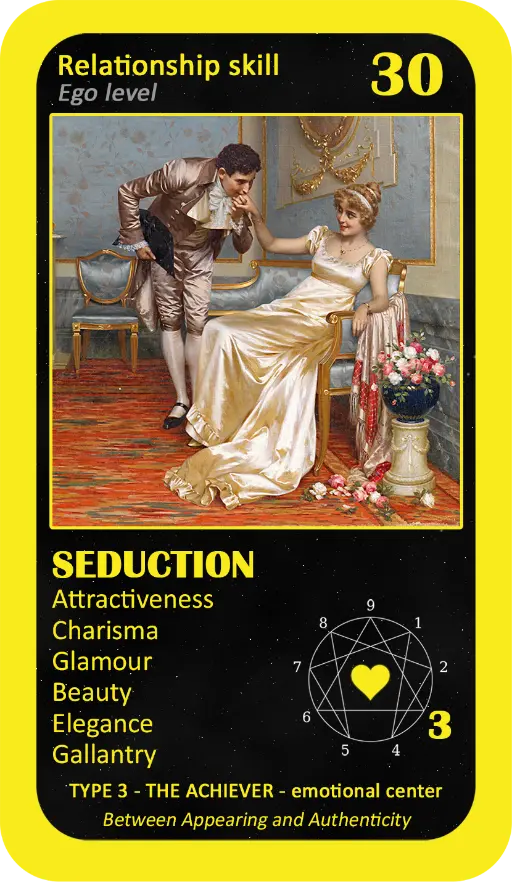
Characteristics: Achievers are charming, ambitious, goal-oriented, and concerned with their image. They seek success and recognition, including in their relationships.
In Love: Achievers are often charismatic and dynamic partners, capable of inspiring and motivating their partner. However, they may also be very focused on the external appearance of their relationship, striving to present a perfect couple image.
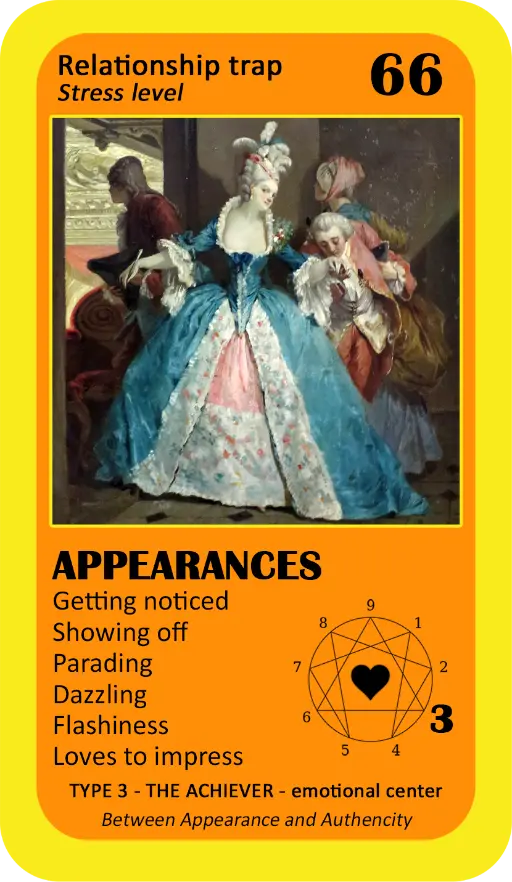
Challenges: Their focus on success and image can make them insensitive to deeper emotional needs, both their own and those of their partner. They may also struggle to relax and enjoy the present moment.
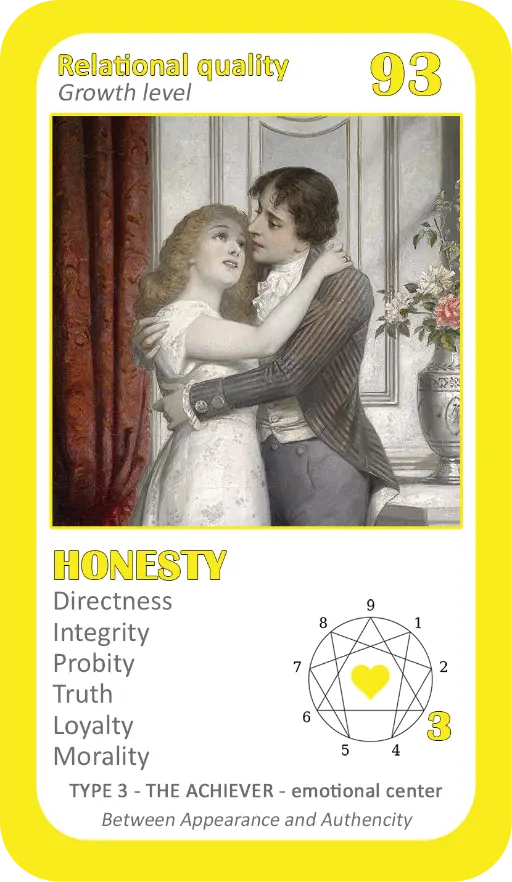
Tip: If you are in a relationship with an Achiever, remind them regularly of the importance of simple, authentic moments, as well as honesty between you. Encourage them to connect with their emotions and to value their relationship for what it truly is, beyond appearances.
Type 4: The Individualist in Love

Characteristics: Individualists are creative, sensitive, and introspective. They seek a deep emotional connection and a relationship that reflects their unique identity.
In Love: Individualists often seek a relationship that allows them to explore and express their emotions. They are capable of creating moments of great emotional intensity but can also be prone to mood swings.
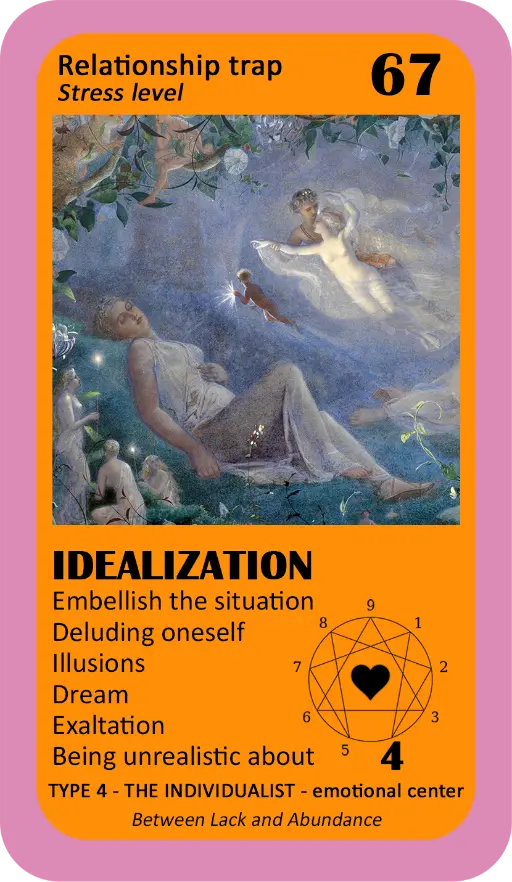
Challenges: Their quest for authenticity and their tendency to feel misunderstood can make them demanding or difficult to satisfy. They may also be prone to melancholy or idealizing their partner.
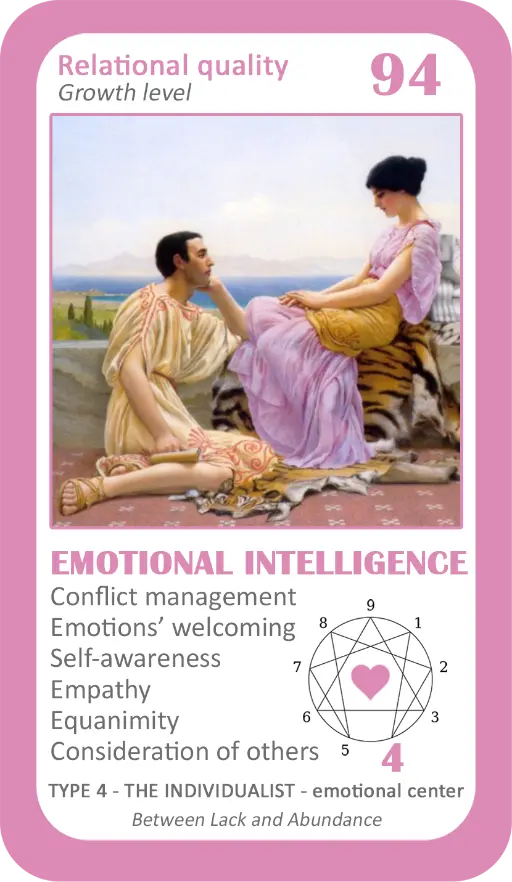
Tip: If you are in a relationship with an Individualist, it’s important to respect their need for emotional depth while providing stable and understanding support. Encourage them to express their feelings, but also ensure that you stay grounded in reality.
Type 5: The Observer in Love
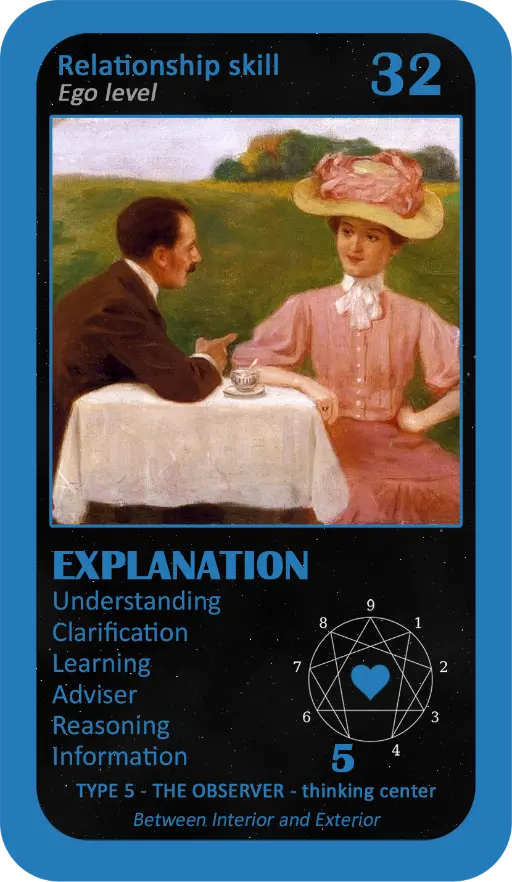
Characteristics: Investigators are analytical, introspective, and enjoy solitude. They seek deep understanding and often need time alone to reflect and recharge.
In Love: Investigators appreciate a relationship based on respect for independence and personal space. They are not always comfortable with displays of affection, preferring to express their love subtly or intellectually.
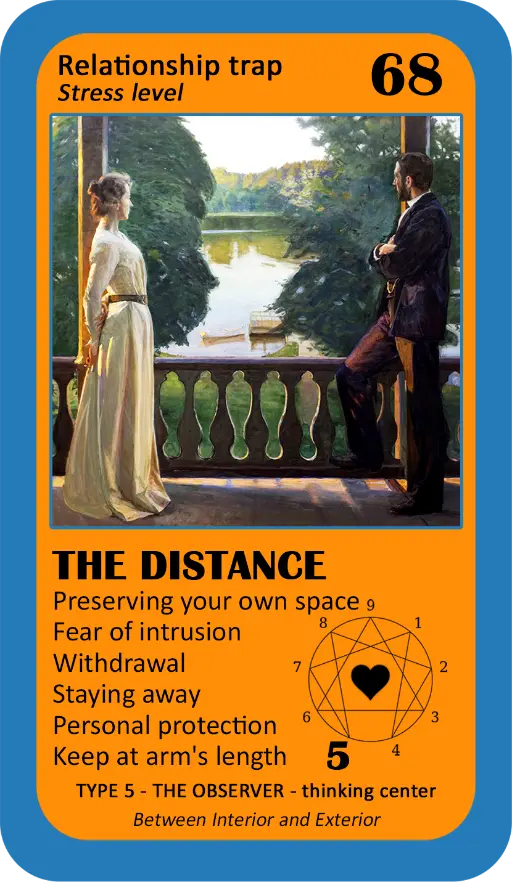
Challenges: Their need for solitude can be misunderstood as a lack of affection or interest. They may also struggle to share their emotions or fully engage in the relationship.
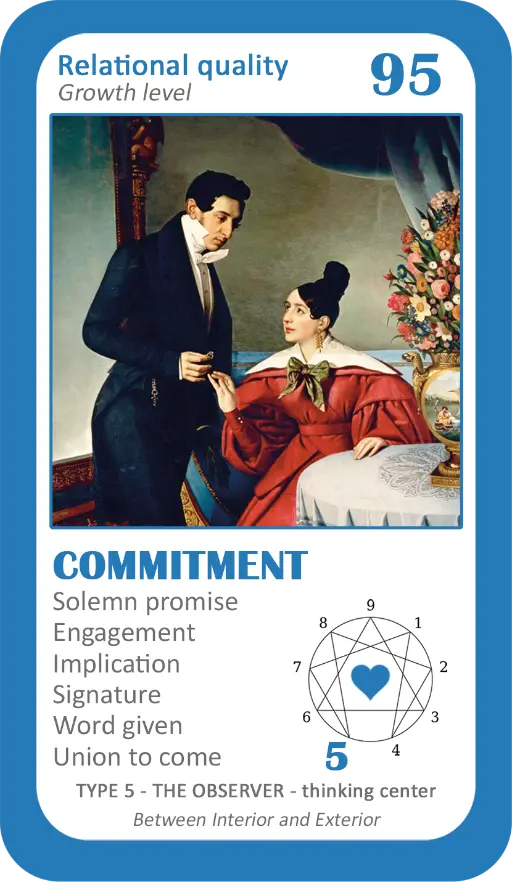
Tip: If you are in a relationship with an Investigator, respect their need for solitude without taking it personally. Encourage deep conversations that allow them to open up at their own pace. Be patient and show them that you accept them as they are.
Type 6: The Loyalist in Love
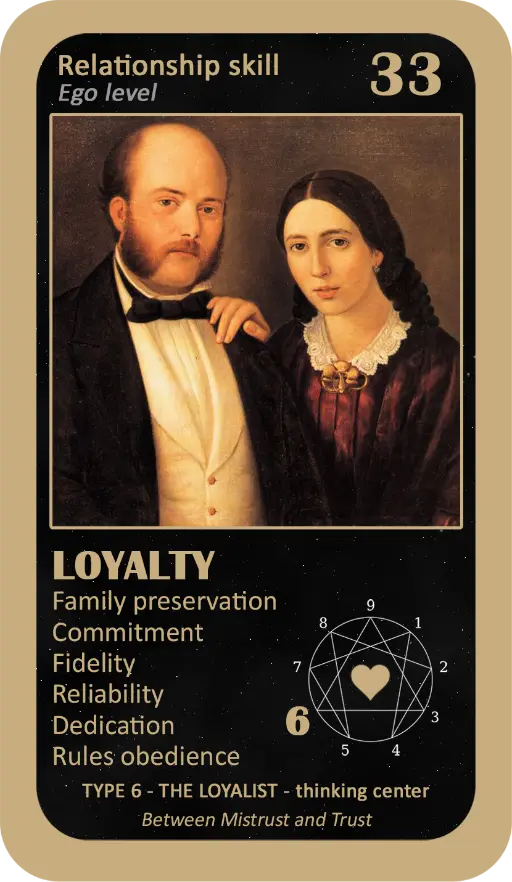
Characteristics: Loyalists are reliable, responsible, and seek security in their relationships. They are often protective and have a strong sense of loyalty toward their partner.
In Love: Loyalists are devoted partners who value stability and security in their relationship. They are willing to invest a lot to maintain this relational stability, often being extremely considerate and attentive.
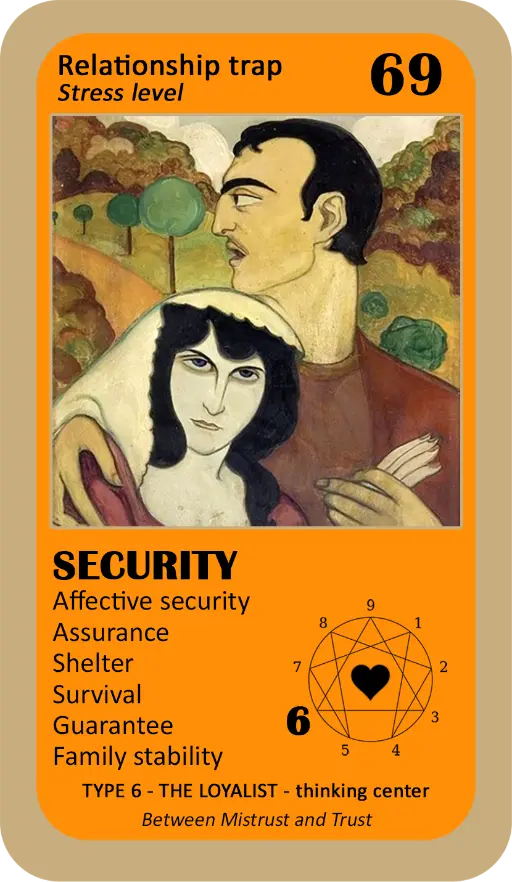
Challenges: Their tendency toward anxiety and mistrust can sometimes create tension. They may be inclined to question their partner’s fidelity or intentions, even without apparent reason.
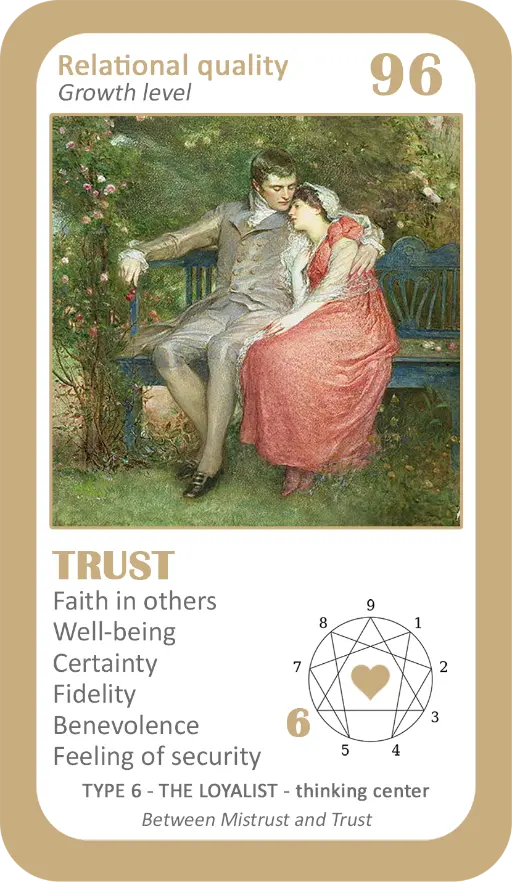
Tip: If you are in a relationship with a Loyalist, it’s important to reassure them regularly and build trust in the relationship. Be transparent and open to ease their concerns and show that you are committed for the long term.
Type 7: The Enthusiast in Love
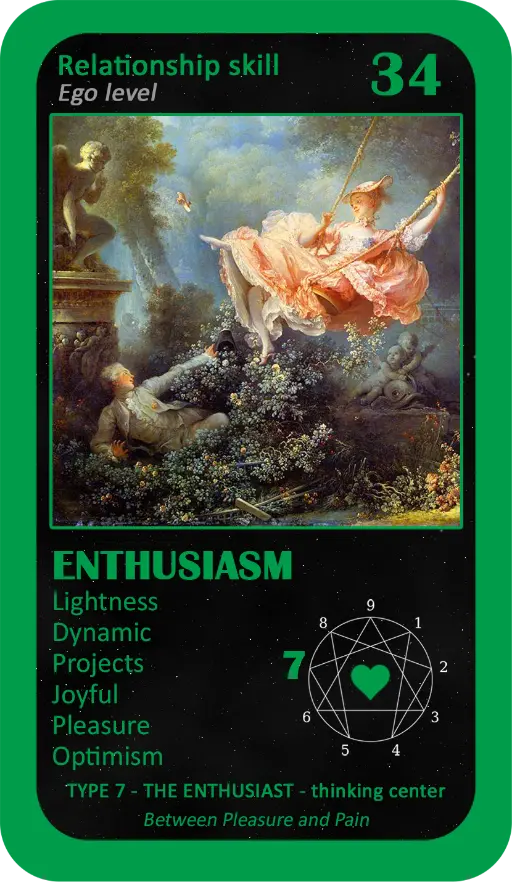
Characteristics: Enthusiasts are optimistic, curious, and seek to make the most of life. They are adventurous and love exploring new experiences.
In Love: Enthusiasts are energetic and full of life. They bring energy and excitement to the relationship but may also struggle to focus on one aspect of their love life.
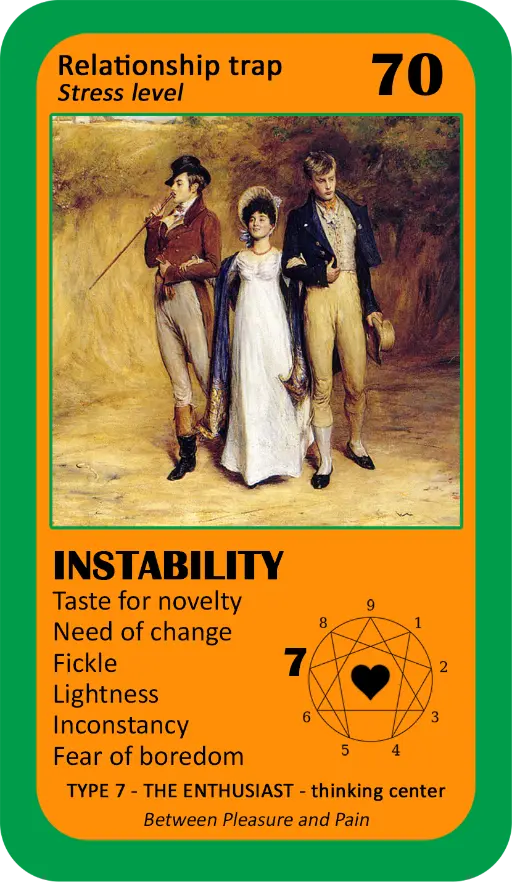
Challenges: Their constant need for novelty can make them unstable or reluctant to commit long-term. They may also avoid the darker or more challenging aspects of the relationship, preferring to focus on the positive.
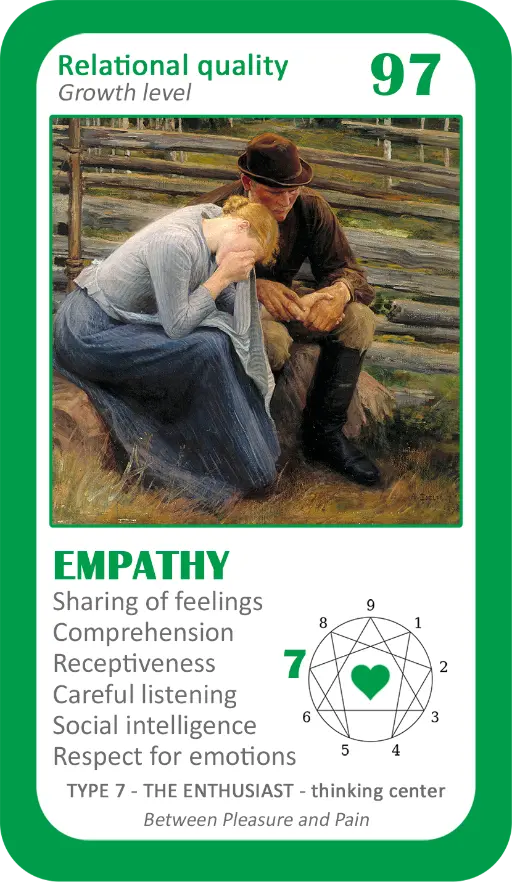
Tip: If you are in a relationship with an Enthusiast, encourage a balance between adventure and commitment. Help them understand that facing challenges together can strengthen your relationship.
Type 8: The Challenger in Love
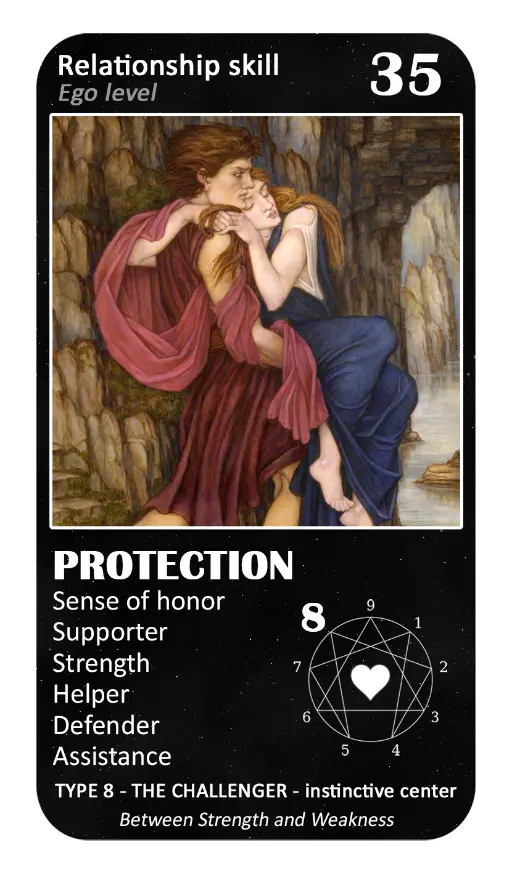
Characteristics: Challengers are assertive, protective, and value control. They seek relationships based on strength, mutual respect, and honesty.
In Love: Challengers are powerful and passionate partners. They are ready to defend their relationship and their partner at all costs, which can make them very loyal and committed.
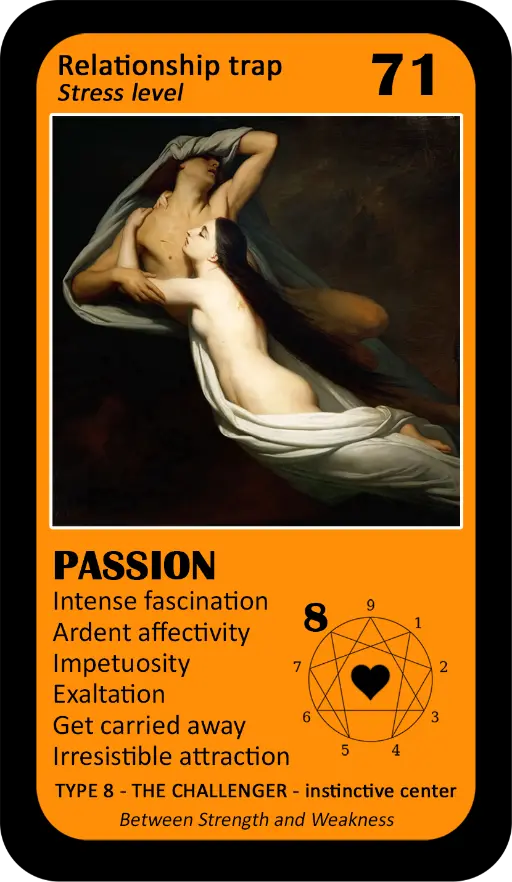
Challenges: Their need for control can sometimes be perceived as dominance or authoritarianism. They may also struggle to show vulnerability, which can create emotional distance in the relationship.
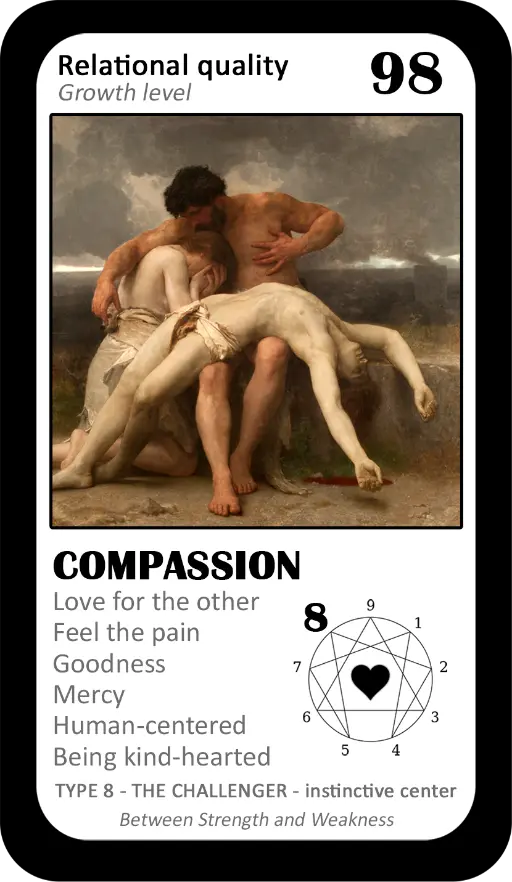
Tip: If you are in a relationship with a Challenger, it’s important to respect their strength while encouraging them to express their deepest feelings and develop their capacity for compassion. Create a safe space where they can feel comfortable being vulnerable.
Type 9: The Peacemaker in Love
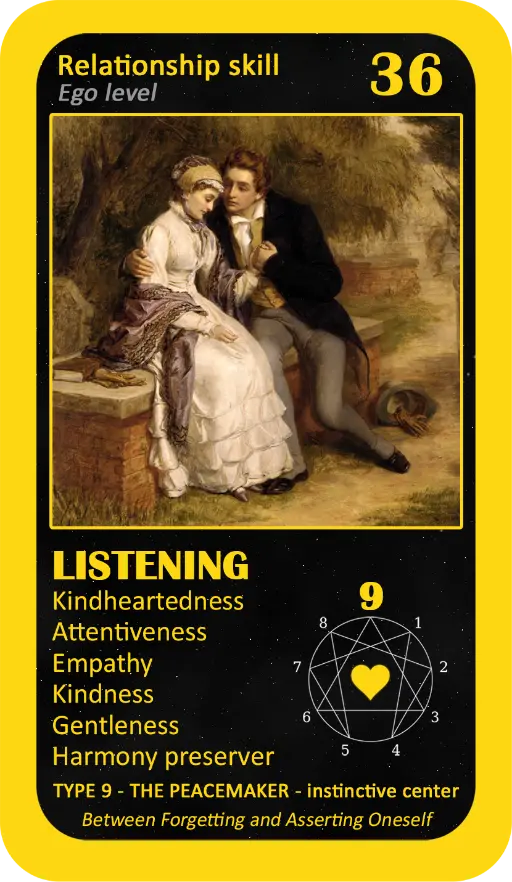
Characteristics: Peacemakers are peaceful, accommodating, and seek to avoid conflict. They value harmony in their relationships and prefer peaceful solutions.
In Love: Peacemakers are caring and attentive partners who seek to maintain a serene and loving atmosphere. They are often very empathetic and willing to make compromises for the sake of the relationship.
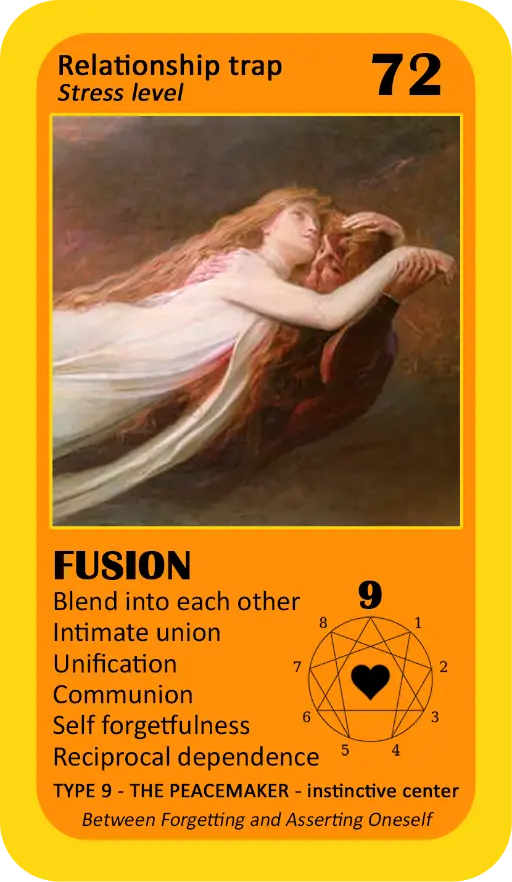
Challenges: Their tendency to avoid conflict can lead them to neglect their own needs or avoid difficult conversations, which can cause long-term frustration. They may also be perceived as passive or indifferent.
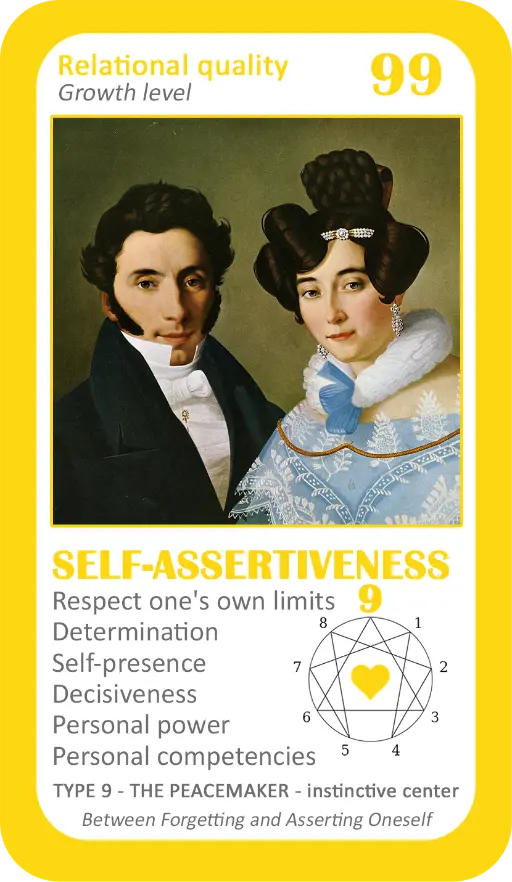
Tip: If you are in a relationship with a Peacemaker, encourage open communication and ensure they feel comfortable expressing their desires and needs. Help them understand that conflict can be an opportunity for growth and strengthening the relationship.
The Love Enneagram Oracle
Did you like the cards above? They are part of the Enneagram Oracle.
Would you like to know more about this Oracle? All the info is there!
How to Use the Enneagram to Improve Your Romantic Relationships
1. Identify Your Type and That of Your Partner

The first step in using the Enneagram in your romantic relationship is to identify your respective types. While many online tests can help you determine your type, it’s also helpful to read about each type to see which resonates most with you. Honest introspection will be the best way to determine your Enneagram type.
2. Understand the Strengths and Weaknesses of Your Relationship

Once you know your types, take the time to reflect on your relationship dynamics. What are your strengths as a couple? What are the areas where you tend to clash or misunderstand each other? Understanding these patterns through the lens of the Enneagram can help you address issues before they become major conflicts.
3. Practice Empathy and Compassion

The Enneagram teaches us that each person has their own set of fears, desires, and motivations. Use this knowledge to practice empathy and compassion towards your partner. When conflicts arise, try to see things from their perspective, understanding that their reactions may stem from their core type’s vulnerabilities.
4. Communicate Openly About Your Needs

Open communication is essential in any relationship. Use your understanding of the Enneagram to communicate your needs and desires more effectively. Let your partner know how they can support you, and be open to hearing the same from them.
5. Be Patient and Persistent

Personal growth and relationship building take time. Be patient with yourself and your partner as you navigate the complexities of your personalities. The Enneagram is a tool for lifelong growth, not a quick fix. As you both evolve, so will your relationship.
Conclusion: Cultivating a Fulfilling Relationship with the Enneagram
The Enneagram is more than just a personality test; it’s a powerful tool for understanding yourself and your partner on a deeper level. By integrating the insights of the Enneagram into your romantic relationship, you can foster a more compassionate, understanding, and fulfilling partnership. Remember, the goal is not to change your partner but to understand them better, creating a space where both of you can grow and thrive together.
-----
This article was written using artificial intelligence and has been verified, checked and edited by Elena. Did it help you better understand the Enneagram? Please share your thoughts or ask questions in the comments. If you would like to learn more about the Enneagram, check out Elena’s self-published Enneagram Oracles, or download Elena’s free e-book “Introduction to the Enneagram.”








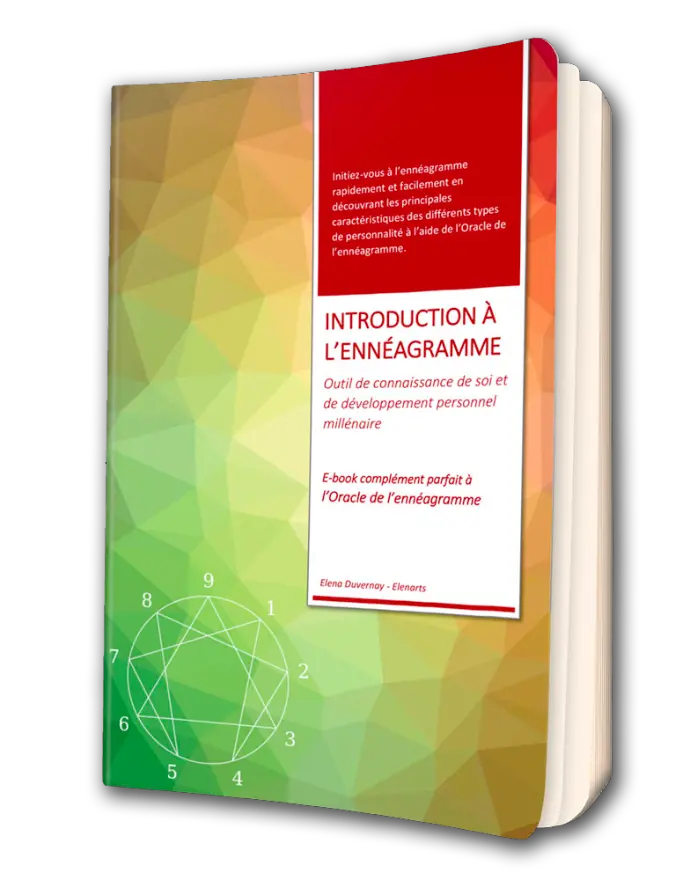
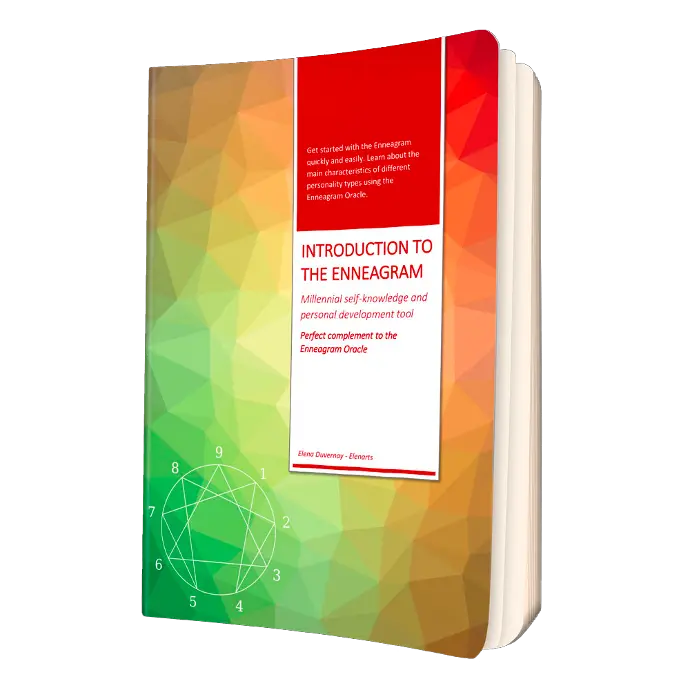

How the Enneagram Can Transform Your Romantic Relationships